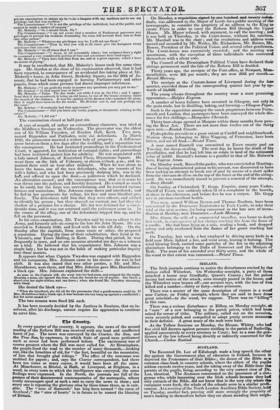frbe Csuntrg.
In every quarter of the country, it appears, the news of the second reading of the Reform Bill was received with one loud and unaffected burst of joy. The news was conveyed by the Courier, the Sun, and the True Sun, by expresses, in which feats of speed were performed such as never had been performed before. The excitement was of course greatest where the Bill was most called for. At Birmingham, the people lined the road to the number of many thousands,—looking out, like the Israelites of old, for " the feet, beautiful on the mountains, of him that brought glad tidings." The office of the newsman was mobbed for papers; and, says the Courier correspondent, had there been ten times as many copies, it would have been all the same. At Manchester, at Bristol, at Bath, at Liverpool, at Brighton, in a word, in every town to which the intelligence was conveyed, the same feelings were expressed. In the North, thejournals are full of the praises of their disinterested contemporaries of the metropolis, whose costly messengers sped at such a rate to carry the news to them ; and every one is repeating the glorious nine by three times three, as is suit- able. The "nine of diamonds" has long been termed " the curse of Scotland ;" the " nine of hearts" is in future to be named the blessing of Britain.
On Monday, a requisition signed by one hundred, *ad twenty
duals, was addressed to the Mayor of Leeds for a public meeting of the townspeople, to consider the propriety of an address to the King to create Peers in order to carry the Reform Bill through the Upper House. Mr. Mayor refused, with argument, to call the meeting; and it was held on Thursday, in the Court-house, without his sanction.. Mr. Marshall was in the chair ; and the resolutions and address were moved and seconded by Mr. Wailes, Mr. Richardson, Mr. Baines, Mr. Bower, President of the Political Union, and several other gentlemen. The Court-house was excessively crowded ; and the meeting was unanimous, with the exception of three individuals who contented themselves with a silent vote.
The Council of the Birmingham Political Union have declared their sittings permanent until the fate of the Reform Bill is decided.
Thirty years ago, the receipts of the Post-office, at Newport, Mon.. mouthshire, were 201. per month ; they are now 2601. per month.... Bristol Mercury.
The receipts at the Custom-house of Liverpool during the Tate quarter, exceeded those of the corresponding quarter last year by up- wards of 54,0001.
The young wheats throughout the country wear a most promising appearance.—Halifax Express. A number of heavy failures have occurred in Glasgow, not only he the grain trade, but in distilling, baking, and brewing.—Glasgow Paper.
Such is the opposition amongst the coach proprietors between Ports- mouth and London, that passengers have been conveyed the whole dis- tance for five shillings.—Hampshire Chronicle.
Thirty beer-shops opened at Margate within three months from pass- ing the Beer Act. There are not more than twelve out of the thirty open now.—Kentish Gazette.
Hydrophobia prevails to a great extent at Cardiff and neighbourhood. Sixteen sheep, belonging to Miss Wapping, of Peterston, have bees bitten, and are all dead.—Bristol Times.
A man named Bouttell was committed to Essex county gaol on Tuesday, for sheep-stealing. The next day, he learnt the death of his grandfather, and that he had left him an estate in land of the estimated. value of 5,000/. Bouttell's fortune is a parallel to that of Mr. Bulwer's. hero, Eugene Aram.
On Monday week, Russell the gaoler, who was convicted at Hunting- don of having administered poison to his servant, was discovered to have been making an attempt to break out of gaol by means of a short spike from the chevaux-de-frise on the top of the fence at the end of the airing- yard. He was immediately ironed to prevent a renewal of the attempt. —Bury Herald.
On Sunday, at Chelmsford, T. Gepp, Esquire, many years Under- Sheriff of Essex, was suddenly taken ill of a complaint in the bowels, at three in the afternoon, and before five he was a corpse. Mr. Gepp was in previous excellent health.
Two men, named William Burton and Thomas Boulton, have been committed by the Doncaster Magistrates to York Castle, to take their trial at the next assizes, for being concerned in the late acts of incen- di:trim at Bentley, near Doncaster.—Leeds Mercury.
Mrs. Grant, the wife of a commercial traveller, was burnt to death last week, in consconence of her clothes catching fire from the flame of a candle. She had beetslying on a sofa, reading a book, and dropped. asleep and only awakened from the flames of her gown reaching her neck.
On Tuesday, last week, a boy employed in driving away birds in a field near Mere, lighted a fire, and went away, leaving it burning. The wind blowing fresh, carried some particles of the fire to the adjoining plantations belonging to the Duke of Somerset and the Marquis of Bath. The mass of fire extended over thirty acres, and the whole of the wood to that extent was consumed.—Bristol Times.






















 Previous page
Previous page